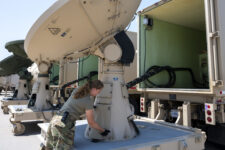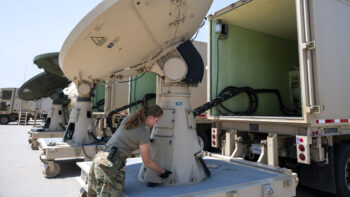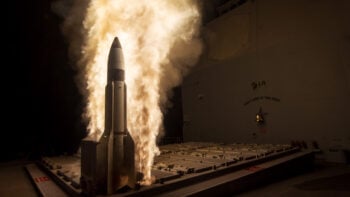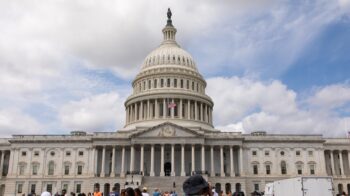
WASHINGTON: The administration has spent the last 48 hours insisting they would not in good conscience submit a Pentagon budget that kept under current spending caps, that national security simply needs more money. This afternoon, the top Democrat on the House Armed Services Committee, Rep. Adam Smith, said more money almost certainly isn’t coming. (Note: he is, of course, not an appropriator.) But Republican Randy Forbes, a top contender to replace HASC’s outgoing chairman, was most positive on the administration’s chances.
Speaking this afternoon at Bloomberg Government’s defense summit, Smith and Forbes agreed on their opposition to the 10-year, half-trillion defense cut known as sequestration, and indeed on many other matters. “We are the most bipartisan committee in Congress,” Smith said, “[though] that’s a very low bar to jump over these days.” And both men declined to give odds on whether sequestration was here to stay. But Smith, the Democrat, was clearly more pessimistic.
“There isn’t much of an appetite for raising the topline,” Rep. Smith said. “Personally, I’d turn off sequestration tomorrow,” he said, but if you try to increase defense spending above the levels set by the sequester and December’s budget deal, there’d be a “domino effect” as Democrats would insist on raising domestic discretionary spending to match. “That brings you back to the ‘grand bargain’” that has eluded legislators since 2011, “where you cut entitlements and raise taxes,” Smith said. “It’s a unicorn, basically, and we need to stop talking about it.”
Forbes, however, kept hope alive: We can restore Pentagon spending without reopening the entire can of worms, he said, because to “provide for the common defense” has to be a higher priority than other kinds of federal spending.
“If we get defense spending wrong, none of the rest of this stuff matters,” Forbes said. “What truly do we need to defend and protect the United States of America?… Neither political party has been asking that question. They’ve been asking how much do they want to spend.” That includes his own party, he emphasized: “We have a number of members in the Republican conference who are so fixated on just the budget issues that they really have not stepped back and asked…what’s the risk to the United States of America?”
Remember, Forbes added, defending the US doesn’t just mean defending US soil: Our economy depends on free trade around the world, particularly – a favorite point for the Virginian who is also HASC Seapower subcommittee chairman – goods carried by ship and financial transactions carried by undersea fiber-optic cables.
Plus terrorists around the world are gunning more for the US than for most other countries, Smith added, making global counterterrorism a matter of homeland security. “I have this argument with some people in my caucus all the time,” Smith said. “The United States of America has defense responsibilities that are vastly greater than other countries, [and] if you get to those sequestration numbers…you can’t fund the strategy we have.”
But “there is no concrete idea out there at the moment to put more money into the defense budget,” Smith said. “You don’t have consensus” on whether to raise taxes, cut entitlement spending (there’s precious little room left to cut discretionary spending), or simply repeal the sequestration caps and accept a higher budget deficit.
In fact, it will be hard enough to get any specific spending cut. “They’re all going to be brutally tough,” Smith said. “The budget hasn’t actually been released yet, [but already] we’ve seen a ton of criticism: ‘I don’t like this cut; I don’t like that cut.’” What you have not seen are any counterproposals of what to cut instead, Smith warned. In fact, Congress recently extended sequestration to undo the December budget deal’s decrease in cost of living adjustments (COLA) for military retirees.
Just a few hours earlier, Vice-Chairman of the Joint Chiefs of Staff, Adm. James “Sandy” Winnefeld, had told the Bloomberg conference that such give-backs hurt the military more than they helped it. Whenever Congress rejects a cut, he said, “we’ve got to find something else to take out. It’s got to come out of readiness or modernization or force structure, assuming it’s a zero sum game.” (Winnefeld would be happy to take a higher topline, of course, but as Smith said, that’s unlikely). When it comes to defense budgeting, said the admiral, “this is a 20-dimensional Rubik’s cube and moving one part affects all the other parts.”
The administration’s priority has been protecting America’s high-tech edge – research and development, cybersecurity, and pricey programs such as the F-35 stealth fighter – at the price of shrinking the force and completely retiring some older systems such as the Kiowa helicopter and A-10 Warthog ground attack plane.
That’s an approach defense contractors can get behind. “Under the existing budget caps we have a fundamental choice between either a much smaller military that is more technologically advanced as a result of minimizing cuts to modernization programs, or retaining the military at nearly its current size but creating and deploying little or no new capabilities,” Aerospace Industries Association president Marion Blakey testified to the HASC today. “We agree with Secretary Hagel that we must be able to counter and surpass the technological advances of our potential adversaries.” Blakey also called for the administration and Congress to “identify and protect core, military-unique private sector capabilities that are most needed to defend our homeland and build security globally.”
But if Congress rejects the administration’s proposed cuts, what gives instead? Modernization will certainly suffer, but many modernization programs have strong political and industrial backers to protect them. Smith fears the lowest common denominator will be to cut training, maintenance, and other low-visibility readiness items, he said: “That’s what leads to a hollow force.”
“People in Congress are driven by poll numbers, unfortunately,” Forbes said. “People say ‘nobody cares’… but I tell you they will care if you lay these facts before them.” So far, however, Forbes and his HASC comrades have had a hard time even getting their fellow legislators to show up for classified briefings on sequestration’s damage to the national defense.
The Pentagon really does need all the money in the administration budget, Adm. Winnefeld said. But if you can’t get that, at least let’s not return to the budget chaos of the last few years. “All I want for Christmas is some predictability in our budget,” he said. “It would allow us to really plan prudently for the future.”
48 US state governors object to DoD plan to shift Guard units to Space Force
Despite Air Force Secretary Frank Kendall’s reassurances, the governors are outraged at what they see as a Defense Department end-run around their authorities that they say could set a negative precedent.


























